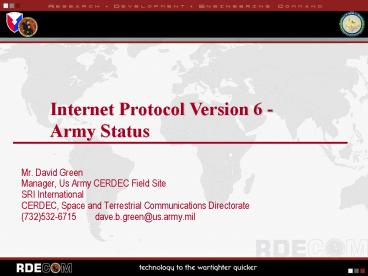Mr' David Green - PowerPoint PPT Presentation
1 / 9
Title:
Mr' David Green
Description:
Transition mechanisms - many still IETF drafts (ex: DSTM) Security - PKI standards still a problem! ... Still some areas lagging for may delay 'Native IPv6' ... – PowerPoint PPT presentation
Number of Views:36
Avg rating:3.0/5.0
Title: Mr' David Green
1
Internet Protocol Version 6 - Army Status
- Mr. David Green
- Manager, Us Army CERDEC Field Site
- SRI International
- CERDEC, Space and Terrestrial Communications
Directorate - (732)532-6715 dave.b.green_at_us.army.mil
2
Army IPv6 Strategy
- DOD goal driven IPv6 by 2008!
- Army has begun procuring, acquiring, developing,
testing IPv6 systems - Wrote Army IPv6 transition plan (v1.0 in August)
- Working to incorporating IPv6 into all of Armys
Enterprise Architectures - LandWarNet
- Business Enterprise Architecture
- Battle Command Architecture
- Migrating to dual-stack backbone, tunnels on
edges, translation as last resort - Native v6 switch begins after 08 push
interoperability to edge - Reducing financial impact by relaxing 08
requirement to leverage existing technical
refreshment cycles and pre-planned product
improvements for non-COTS systems
Make Army Enterprise IPv6 Capable and Architect
the Solution
3
Cost Estimate Trend
Completion Date FY 2008 ___B
Completion Date FY 2012
Cost
Completion Date TBD (2008-2016)
___M
TBD
Time
Initial Estimate
Additional Guidance
Architectural Adjustment
- FY08 is Mandate
- IPv6-capable COTS Available
- Many Army defense systems upgrades not available
- FY08 is Goal
- Responsibilities Better Defined
- Systems within 5 yrs of obsolescence need not
upgrade - Lower Tactical Internet will not transition but
will be replaced
- Alignment (capability-based) with other
initiatives - Global Information Grid Bandwidth Expansion
- Task Force Modularity
- LandWarNet Mission Area Architectures
- Deployment of Enterprise-level Transition
Mechanisms
4
Cost Graphs
(Procurement, Development, Testing,
Experimentation, Transition Mechanisms)
Begin IPv6 Opns
IPv6 Dominance
Cost
End IPv4 Opns
Tech Refresh (P3I) Resources for IPv6
Pre-Programmed in POM
Time
Oct 2012
Phase 2
Phase 1
Oct 2003
Oct 2010
Oct 2013
5
IPv6 Issues Acquisition Challenge
- 2008 Native IPv6 mandate changed to a goal due to
cost and tech challenges - More realistic goal technically and economically
- Major COTS systems transition 2008
- Army systems upgrades by 2012 via normal tech
refresh - Replace many systems rather than upgrade
- Business and institutional systems migrations are
dependent on commercial vendors support and
implementation of IPv6 - We must get industry partners (not just defense
contractors) working to help meet our goals
6
IPv6 Technical Challenges
- Many key IPv6 enabling protocols, especially for
tactical wireless, security, QOS, and transition
mechanisms, are still in development and will not
be completed at the current effort levels before
the April 05 deadline for specifying SW Block
III and 2008 fielding - Examples of technical challenges that impact
transition schedule - Transition mechanisms - many still IETF drafts
(ex DSTM) - Security - PKI standards still a problem! No
IPSEC end-to-end, defense-in-depth
implementations or architectures better than IPv4
yet but coming - QOS - IPv6 QOS not better than IPv4 yet but
coming! - Tactical Wireless
- RObust Header Compression (ROHC) suitable for
tactical wireless - Mobile Ad-hoc Routing (MANET) routing for
wireless IPv6 - Mobile IPv6- Security and how we utilize this new
mobility service - Dual Stack Routing OSPF Currently requires both
OSPFv2 and OPSFv3 but IETF has a new draft for
sending IPv4 via OSPFv3 - Application migration to IPv6 is a complex and
difficult area of transition
7
Critical Tech Events for IPv6 Transition
SW Block 4
Native IPv6
SW Block 3
Known Planning Dates
FY08
Implementation
Scheduled Tech Insertion Dates
Dual Stack Transition
FY07
SW Block 4 Defined
Pilot Study Date?
Forecasted Tech Study Dates
SW Block II
FY06
Establish DNS Root
October 05 HAIPE
SW Block 4 Preparation
Pilot Study Date?
Apr 05 SW Block 3 Defined
IA Tools Study
Address Assignment?
Impacts Scalability
Jan 05? Update JTA
FY05
Army Tactical Net Studies
Mobility
Aug 04 Army TP v1.0
Army Enterprise Studies
Routing
QOS Architecture
Routing
MoonV6 Phase II
Header Compression
SBCT Study
Security Architecture
Addressing Architecture
SW Block 3 Preparation
Jan 2004 JTA-A V7.0
FY04
Dec 03 DOD TP v1.0
8
Current Status
Army Roadmap Dec 03
Army Requirements Mar 04 (FY06-11 POM)
IPv6 Architecture Development due Sep 04
IPv6 Implementation, Testing Oct 05 and Beyond
Army Initial Guidance Nov 03 Additional Guidance A
pr 04
Army Transition Plan (Draft) Mar 04
Army Transition Plan (v1.0) Due Aug 04
Army Funding for IPv6 Sep 04 (Pres Budget) Mar
05 (FY07-11 Mini-POM)
Transition of all systems by FY08 too costly!
DoD Goal Complete Transition by FY2008
9
Conclusions
- We see IPv6 transition as a critical force
multiplier --- - Connectivity, Security, Mobility and
Auto-Configuration - Army IPv6 Transition Plan v1.0 for release in
August - Army transition all major nets and systems 2008
2012 - Army plan Dual stack everywhere, tunnels through
legacy edge nets, aggressive transition to Native
IPv6 (DSTM?), translation as a last resort - Still some areas lagging for may delay Native
IPv6 - Transition Mechanisms, QOS, Security, IPv6 over
wireless - Need help from industry to think outside of IPv4
Box - Create new defense-in-depth security, QOS, and
information sharing beyond IPv4 paradigms






![❤[PDF]⚡ David Zwirner: 25 Years PowerPoint PPT Presentation](https://s3.amazonaws.com/images.powershow.com/10047399.th0.jpg?_=202406041011)
























